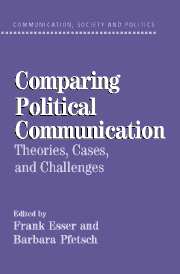Book contents
- Frontmatter
- Contents
- Contributors
- Comparing Political Communication
- INTRODUCTION
- I THEORIES AND METHODS
- II CASES
- 6 Global Political Communication: Good Governance, Human Development, and Mass Communication
- 7 Local Political Communication: Media and Local Publics in the Age of Globalization
- 8 Strategic Political Communication: Mobilizing Public Opinion in “Audience Democracies”
- 9 Political Campaign Communication: Conditional Convergence of Modern Media Elections
- 10 Political Communication and Electronic Democracy: American Exceptionalism or Global Trend?
- 11 Political News Journalists: Partisanship, Professionalism, and Political Roles in Five Countries
- 12 Political Communication Messages: Pictures of Our World on International Television News
- 13 Political Communication Effects: The Impact of Mass Media and Personal Conversations on Voting
- III PERSPECTIVES AND CHALLENGES
- Author Index
- Subject Index
- References
6 - Global Political Communication: Good Governance, Human Development, and Mass Communication
Published online by Cambridge University Press: 24 November 2009
- Frontmatter
- Contents
- Contributors
- Comparing Political Communication
- INTRODUCTION
- I THEORIES AND METHODS
- II CASES
- 6 Global Political Communication: Good Governance, Human Development, and Mass Communication
- 7 Local Political Communication: Media and Local Publics in the Age of Globalization
- 8 Strategic Political Communication: Mobilizing Public Opinion in “Audience Democracies”
- 9 Political Campaign Communication: Conditional Convergence of Modern Media Elections
- 10 Political Communication and Electronic Democracy: American Exceptionalism or Global Trend?
- 11 Political News Journalists: Partisanship, Professionalism, and Political Roles in Five Countries
- 12 Political Communication Messages: Pictures of Our World on International Television News
- 13 Political Communication Effects: The Impact of Mass Media and Personal Conversations on Voting
- III PERSPECTIVES AND CHALLENGES
- Author Index
- Subject Index
- References
Summary
The growth in electoral democracies presents many potential opportunities for human development. The last quarter of the twentieth century witnessed a dramatic expansion in political rights and civil liberties worldwide. Since the start of the “third wave” of democratization, in 1974, the proportion of states that are electoral democracies has more than doubled, and the number of democratic governments in the world has tripled (Diamond 2001). Countries as diverse as the Czech Republic, Mexico, and South Africa have experienced a radical transformation of their political systems through the establishment of more effective party competition, free and fair elections, and a more independent and pluralistic press. Many hoped that these developments would expand the voice of the disadvantaged and the accountability of governments, so that policy makers would become more responsive to human needs, and governments could be removed from power through the ballot box if citizens became dissatisfied by their performance.
Yet in practice, after the initial surge in the early 1990s, many electoral democracies in Latin America, Central Europe, and Sub-Saharan Africa remain fragile and only poorly consolidated, often divided by ethnic conflict and plagued by a faltering economic performance, with excessive executive power in the hands of one predominant party and a fragmented opposition (Linz and Stephan 1996). The central danger, illustrated by the nations of the Andean region, lies in disillusionment with democracy, and even occasional reversals (Norris 1999; Pharr and Putnam 2000; Lagos 2001; Plattner and Diamond 2001).
- Type
- Chapter
- Information
- Comparing Political CommunicationTheories, Cases, and Challenges, pp. 115 - 150Publisher: Cambridge University PressPrint publication year: 2004
References
- 25
- Cited by

